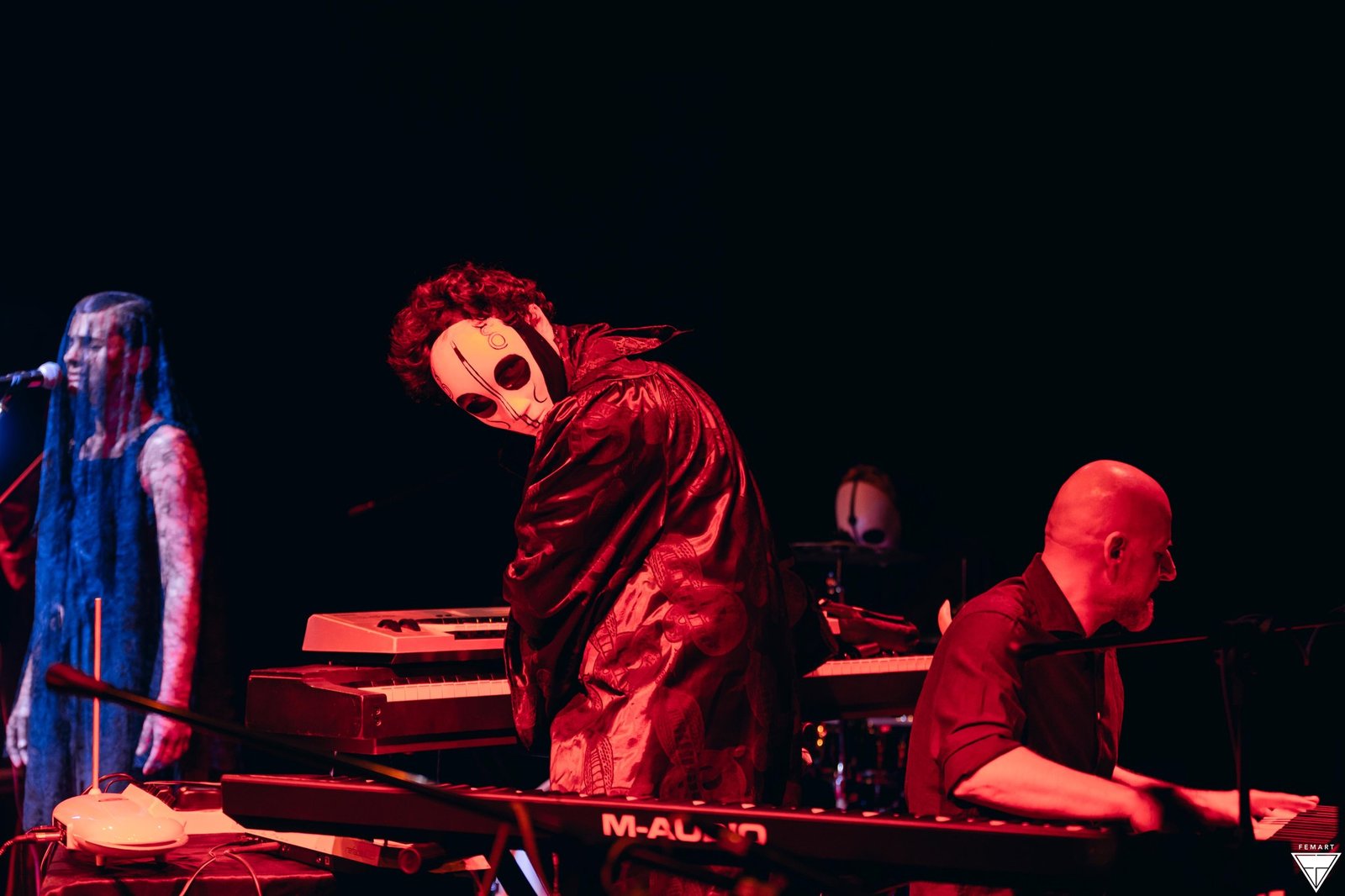By: Gili Hoxhaj
The musicians take the stage wearing masks and full-body coverings. The scene feels almost surreal. You can’t read a single expression. The Liburn Jupolli Ensemble chose a unique format to present their concert “Tales of Scapes” on the second night of FemArt. Entirely unconventional—unpredictable. Numerous instruments come into play. The concert itself feels like theatre. Fittingly, it all unfolded at the Amphitheatre of the National Theatre of Kosovo, in the Palace of Youth in Prishtina.
It felt like memories and stories unraveling into waves of sound—rising and falling. A nonstop passage through life. For much of the concert, there was no pause. The musicians were entirely immersed in their performance. Ensemble founder Liburn Jupolli himself moved ceaselessly between instruments—from piano to theremin, to the lahuta, çifteli, and synthesizers—blending diverse musical styles into a singular, authentic sound.
It was a musical explosion—and the ensemble’s debut live performance just ahead of their first album release. This performance made it clear: they’re here to offer something truly uncommon. A musical mosaic, a journey full of unexpected sonic turns. This is the path the ensemble has carved for themselves, just months before launching their album.
The ensemble plays across genres: jazz, experimental and algorithmic electronics, Albanian and Balkan folk through microtonality and sound processing, metal and industrial textures, contemporary classical, noise, and pop—not as genres, but as structural elements.
The Liburn Jupolli Ensemble is a musical formation that challenges conventional sonic boundaries and transforms into an artistic laboratory where contemporary, experimental, and avant-garde music coexist in harmony—one that may feel strange at first, but by the end of the concert, becomes mesmerizing. Jupolli himself sees no boundaries between instruments, styles, or ideas, making this group a universe in motion, where every performance is a new journey—an unrepeatable experience. It’s an exploration of the meta-energy of folklore, powered by advanced technology.
“Our goal is to offer something honest—from our work, our soul, and our community as musicians. We come from different music scenes and backgrounds—some from jazz, some from metal, some from classical—and many of us have never played together before. We’re trying to create shared music,” said Jupolli after the concert.
Yllka Simnica brought a subtle ethno touch through her flute, kaval, and ocarina—intertwining tradition with contemporary sound. Philip Konrad Labhart from Switzerland enriched the ensemble with trumpet and shokë flute, adding deeply experimental tones. Fisnik Behluli infused the compositions with energy and drama through his trumpet. Granit Havolli held the rhythm on drums and percussion, while Galdon Reçica used the octo-n and sharki to craft unique textures that blend roots with innovation.
But beyond sound, there was also room for words that struck deeply.
Shpëtim Selmani’s appearance marked a powerful pause—commanding every eye and ear. The only one dressed in a formal suit, he echoed the death of art in places where humanity has lost its reason and soul—in war zones where everything is affected. Art no longer has a place to live, not even in its own home. With a poetic and commanding tone, he held the audience tightly in the grip of his verses. “Then, then, then…”—this phrase repeated, transitioning into the first person singular, touching on many feelings that a person goes through.
On stage, at the piano, joined Kolë Laca from Shkodra Elektronike. The performance concluded with Arbëreshë, the artist dressed in black, her voice rising like a lament. It was as if she was mourning everything Selmani had captured in words—the slow death of humanity.
Through sounds that were often unusual, bold, and profound, the Liburn Jupolli Ensemble created an experience that makes you rethink what music can be. The ensemble embodied the spirit of artistic collaboration—intertwining music with technology and performance, bringing to the stage a world that speaks of the future while staying deeply rooted in the search for truth through art. For an art that dares to ask deeper questions—at the edges and beyond the world we know.

